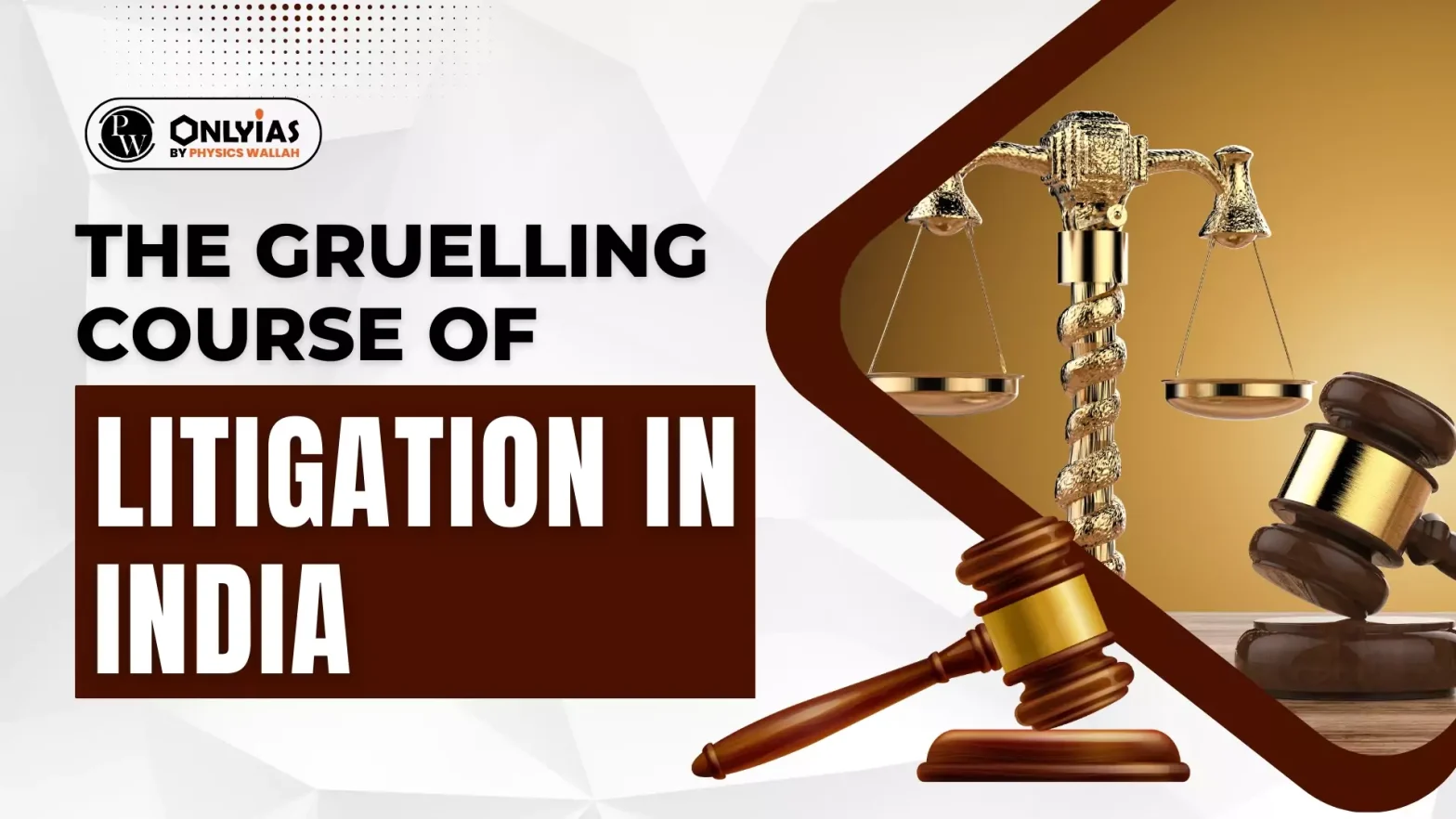At the National Conference of the District Judiciary, President Droupadi Murmu highlighted the issue of court delays, noting that these delays are deterring people from seeking justice.
Why Do People Avoid Going to Courts?
- President Murmu used the term “Black Coat Syndrome” to describe the anxiety and nervousness experienced by ordinary citizens in court settings.
- Irony: People often refrain from approaching the courts even though it is the place where one can ask for justice.
- An individual is aware that approaching courts would lead to delays, harassments, high legal expenses, etc and thus avoid courts.
- Endless Adjournments extend the duration of cases, leading to significant delays in justice delivery.
- The ability to file for Numerous Appeals in different levels of courts.
- Escalating Legal Costs making justice more expensive and inaccessible for many.
Enroll now for UPSC Online Classes
| White Coat Syndrome
White coat syndrome, or white coat hypertension, is the term for when you get a high blood pressure reading in a doctor’s office and a normal reading at home. The anxiety of being around doctors in white coats can make your blood pressure rise. |
Case Flow Management Rules
- Effective case management which involves clear timelines for filing documents, conducting witness examinations, scheduling hearings, and limiting adjournments. All of this should be set when the case is filed.
- In the late 2000s Case Flow Management Rules were introduced. These were meant for district and high courts. However, their implementation wasn’t done properly.
Reasons for Delay in Justice
- Inconsistent Implementation: Despite their introduction in the late 2000s, Case Flow Management Rules have been applied inconsistently across district and High Courts, resulting in limited impact on improving case timelines.
- Systemic Pressures on Judges: Judges face pressures from higher courts to prioritise certain cases (e.g., politically sensitive cases), disrupting their ability to enforce proper case management timelines.
- Incentives for Delays: Judges are not incentivized to adhere to deadlines, often extending timelines due to pressures from the legal bar or the expectation that higher courts will condone delays.
- Unit System Distortions: Judges prioritise simpler cases to accumulate points under the unit system, sidelining more complex cases, which adds to delays.
- Lawyer Influence on Scheduling: Lawyers often handle multiple cases in different courts on the same day based on factors such as likelihood of adjournment or the perceived mood of a judge.
- This practice leads to frequent adjournments and delays, as they prioritise cases based on convenience rather than urgency.
- Stay Orders and Interim Reliefs: Litigants often view obtaining a stay order as a victory, particularly in civil matters, which leads to a lack of urgency in pursuing a final resolution.
- Unpredictable Witness Scheduling: Witnesses often face unpredictable court schedules, with testimonies delayed due to adjournments, procedural delays, and last-minute changes. This disrupts their personal and professional lives, discouraging participation and contributing to trial delays.
- Psychological Pressure on Judges: Judges may face pressure from the legal bar and litigants when enforcing strict timelines, particularly if such actions lead to dissatisfaction among lawyers. This may impact a judge’s career progression, resulting in reluctance to impose stricter case management practices.
- Lack of Case Management Training: Judges and court staff often lack adequate training in modern case management practices, leading to inefficiencies in scheduling, document filing, and conducting hearings.
- Limited Technological Integration: Many courts still rely on manual processes for scheduling and tracking case progress, resulting in inefficiencies and delays.
Reforms
- Revamping the Unit System: Judges should be evaluated based on their handling of complex cases rather than just the number of disposed cases. This would encourage attention to more demanding cases.
- Predictable Scheduling Systems: Introducing transparent and predictable scheduling for both lawyers and witnesses, with penalties for unnecessary delays, will help reduce adjournments.
- Incentives for Lawyers and Litigants: Providing rewards for adherence to schedules and discouraging the misuse of stay orders or interim reliefs will help prevent intentional delays.
- Technology Integration: Implementing technological solutions, such as real-time case updates and monitoring of timelines, can streamline case management and identify bottlenecks.
- Witness Support: Offering sufficient compensation and predictable court appearances will ease the burden on witnesses, ensuring their participation without significant disruption to their lives.
Check Out UPSC NCERT Textbooks From PW Store
Conclusion
Addressing court scheduling issues requires a holistic approach that prioritises effective case management, incentivizes all stakeholders, and leverages technology. By fostering a more predictable and efficient judicial process, we can enhance public trust in the legal system and ensure timely access to justice for all litigants.
![]() 11 Oct 2024
11 Oct 2024

